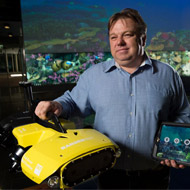
Robotic system can monitor a range of issues facing coral reefs
An underwater drone to protect and monitor the health of the Great Barrier Reef has been developed by researchers at the Queensland University of Technology.
Researchers say the ‘RangerBot’ is equipped with a high-tech vision system which lets it ‘see’ underwater. Launched at Townsville's Reef HQ Aquarium on Friday (31 August), the project is the culmination of around two years of research, development and testing.
“RangerBot is the world’s first underwater robotic system designed specifically for coral reef environments, using only robot-vision for real-time navigation, obstacle avoidance and complex science missions,” explained Professor Matthew Dunbabin of the Queensland University of Technology.
“This multifunction ocean drone can monitor a wide range of issues facing coral reefs including coral bleaching, water quality, pest species, pollution and siltation. It can help to map expansive underwater areas at scales not previously possible, making it a valuable tool for reef research and management.”
Professor Dunbabin also notes that Rangerbot has been ‘trained’ to detect coral-destroying crown-of-thorns starfish. It does so in a similar way to how people learn to differentiate between various forms of sea life.
“Using real-time computer vision processed onboard the robot, RangerBot can identify these deadly starfish with 99.4 per cent accuracy,” he continued. “Once the identification is confirmed, RangerBot can instigate an injection which is fatal for the crown-of-thorns starfish, but doesn’t affect anything else on the reef.”
RangerBot has undergone extensive testing both in the laboratory and on the Reef. Looking ahead, researchers will further collaborate with the Great Barrier Reef Marine Park Authority and the Australian Institute of Marine Science to ensure it is ready for Reef duty.
Image (C) Queensland University of Technology.



 The latest
The latest